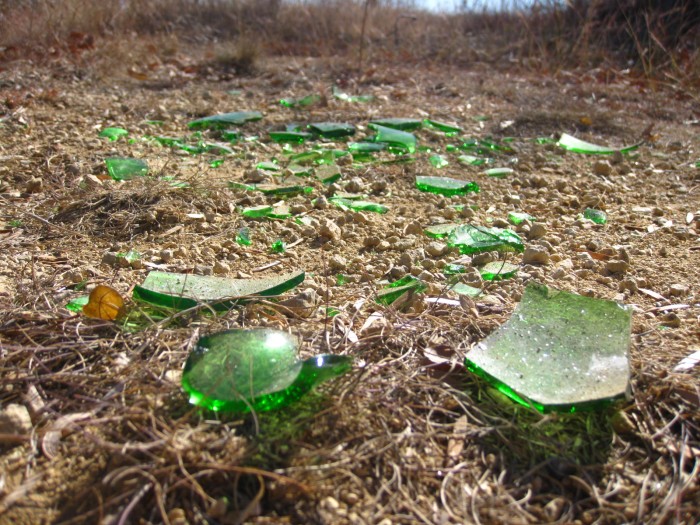It seems like we’re always swimming in social garbage – everything from the “just kidding” remarks from so-called friends to the snarky comments from people who hate you (online and off). When it comes to social garbage all of us have had it dumped on us. And all of us have dumped it on others. Weird thing, though, when I talk to students they all wish their school was a place where they could be accepted for who they are… without all that other crap.
So how do we get there from where we are now? How do we get everyone (including ourselves) to wake up and smell the garbage? This excerpt from my book, Teaching Kids to Be Good People, gives you some new ways to think about gossip, rumors and what it takes to clean up your act.
Don’t Add to the Garbage
Up our street lies Faudé Park. Undeveloped except for some narrow trails carved into the hill, this 13.5 acre community treasure offers a mini-retreat to everyone wandering through. When David and I first ventured up to Faudé’s highest point, we were delighted by the knockout view of Mt. Tamalpais. We were also depressed by the thick carpet of broken beer bottles tossed by partygoers who obviously enjoyed the “natural” environment. (A trashcan sits 20 feet from the peak. But hey, the ground’s handier, right?)
David and I aren’t neat freaks. Far from it. But we hated seeing all that glass in such a beautiful setting, so we started cleaning it up. The first day we spent 30 minutes picking up the biggest chunks of glass. When we returned a week later, new chunks replaced some of what we removed. But we weren’t deterred. Over the next several months, we kept picking up glass.
At some point things began to change. Weekend revelers stopped tossing bottles on the ground. Maybe because they could now see the ground! Or maybe the beauty of the park became apparent and now they decided it wasn’t cool to mess it up. Can’t say for sure, but whatever the reason, David and I were happy with the change and didn’t mind taking a little credit for getting things rolling in the right direction.
Turns out the trends we observed at the park reflect a bona fide sociological phenomenon called the broken windows theory. Apparently, the more rundown a neighborhood becomes, the more likely people will break windows in abandoned buildings, graffiti walls, and litter. The crime rate increases too. Conversely, when a neighborhood gets cleaned up, everything improves.
The turnaround at Faudé Park happened years ago, but I’m pleased to report that as of my walk this morning, the overlook is still totally free of garbage. Of course, not all garbage is equal, and the kind infecting most schools, aka social garbage, is of the invisible yet more toxic variety.
I frequently ask students: “If you walk into a room already littered with trash, is it OK to toss your candy wrapper on the floor?” Some kids will say, “Sure, it’s OK.” Why? Because “everyone else is doing it and you won’t get in trouble.”
Then I ask, “If the floor is clean, is it still OK to toss your trash?” Now most kids will say no. But a few kids are likely to let me know it’s never OK to add to the garbage. Which is when I switch the discussion from candy wrappers to rude comments, rumors, and the rest of the social garbage many kids slog through every day.
A school’s mission statement typically mentions something about respect and social responsibility. But how are schools teaching these values to their students? How are we, as parents, teaching them to our kids? We want them to grow into thoughtful, compassionate young adults who take time to think about their choices before they act, hopefully reflecting: “If I really want less garbage at school and at home, what can I do? Am I willing to watch my mouth and keep more hurtful comments to myself? Am I willing to stand up for someone being teased? Am I willing to speak out against demeaning ‘jokes’? Willing to sincerely apologize when I mess up and hurt someone? Willing to reach out to someone who needs a friend?”
As I see it, the goal of effective parenting (aside from keeping your kid alive and well), is to help him develop a code of ethics. If you want your child to become a good person whose actions demonstrate a high level of personal integrity, if you want her to help promote more friendship, peace, and justice in the world, you need a plan.
Character development is an ongoing process for each of us. We have to consistently work through all these issues with our kids and our students, our colleagues and our partners. Talk about ethical behavior where you see it and where you don’t. Model it in your own life. Help children evaluate their choices and learn from their mistakes. Help them deal with intense emotions in appropriate and responsible ways so they don’t intentionally hurt other people.
There are no easy answers here, but one thing is for sure, the world desperately needs less garbage.













[…] social garbage girls throw at each other is the stuff of rumors, gossip, harassment, and exclusion. And it often […]
Pingback by GirlWorld: Twisted values, twisted friendships | Annie Fox's Blog — March 25, 2014 @ 10:33 pm